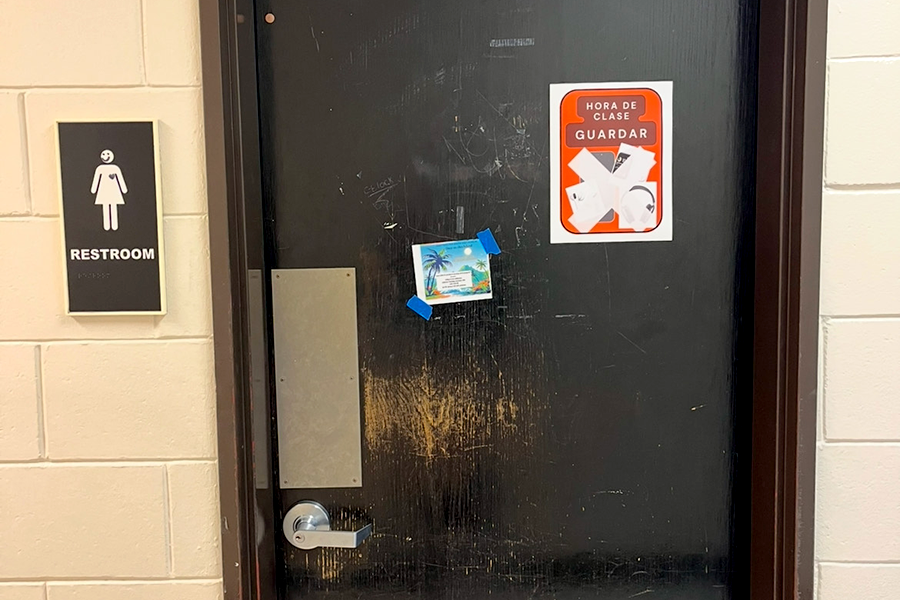Before senior Clara Schultz leaves for school in the morning, she lays out the things her mom will need for the day. She finishes the dishes she started the night before, because Schultz knows her mother can’t. After school, Schultz will come home and make dinner for her mother before she does anything for herself.
Schultz’s mother has a disease called Ataxia. Ataxia is a degenerative, meaning it worsens over time, neurological disorder that affects balance, coordination, and speech.
“When I was little I thought she was normal,” remembered Schultz. “I don’t know when I realized she wasn’t.”
Many students at South grow up with a parent who has physical disabilities. “They have more responsibility at home and their life experience is different,” stated South social worker Sherri Harris. “Things might not be as easy, but depending on the kind of disability it might not be that big of a deal.”
For junior Amirah Ellison, Multiple Sclerosis (MS) is a large part of her family’s life.
MS is a disease that affects the central nervous system. The severity and specific symptoms vary from person to person. “Our whole extended family deals with it as one big cluster,” explained Ellison.
Her mother, grandmother and aunt are all living with MS. “It’s a disease that is not new to our family so we kind of know how to deal with it, or how to move around it.”
“[My mom] has had MS since I can remember so it’s not like I’ve had to adjust to living with a parent with a disability,” said Ellison.
She explained that her family has had to be more careful with their decisions. “We had to really think how it’s going to affect each other,” she said.
MS is also a degenerative disease, and Ellison has seen her mother’s disease symptoms worsen, but they change at a slow enough pace that allow time to adjust.
“When I was really young, she used to be a lifeguard. She still does bike, but she can’t do that as much,” said Ellison.
Senior Hugh Nelson’s mom also has MS, but she moved out of their house in 2000. She moved into a group home, but her MS worsened and she is now in a wheelchair living in a nursing home with 24-hour service.
“I’ve been without a mother for most of my life,” said Nelson. “It affects me immensely.”
Nelson lives with his dad along with his younger brother and sister. “When my mom moved out, we all had to come together because it’s just one parent with three kids. That’s really hard.”
Nelson’s father works most days, leaving a nanny with Nelson and his siblings. “It’s been hard, but it’s something I’ve become used to,” stated Nelson.
Every Sunday, Nelson visits his mother at the nursing home for a couple hours. “I bring her lunch,” he said.
As both Nelson and Schultz’s mother’s diseases have progressed, their lives have also changed.
Schultz’s mother stopped driving when Schultz was in middle school, and can no longer walk on her own.
“Our house is so small that the walls are pretty close together, so between her walker and handrails on the wall, she can move around our house pretty well,” explained Schultz.
Another significant change is that her mom can also no longer speak very clearly. “She obviously still speaks English, but she doesn’t necessarily pronounce things in the best way,” said Schultz.
Nelson’s mother cannot remember anything after the year 2000.
“My mom can’t remember what she ate for breakfast,” said Nelson. “She has no idea who [Barack Obama] is. She has no idea what an iPhone is.” For this reason, Nelson chooses not to introduce many of his friends to his mother.
“A couple of my friends have met my mom,” he said. “I chose not to introduce my friends to my mom because she won’t remember.”
Because it’s just Schultz and her mother living together, Schultz is relied on for many of the household responsibilities.
“I pay a lot of our insurance,” explained Schultz. “She tries to pay me back and make me think there is nothing wrong.”
Schultz is also responsible for buying groceries for herself and her mother, as well as cooking meals.
When Schultz first started buying the groceries, her mom would pay her back. But soon Schultz noticed that by paying her back, her mother’s account went into overdraft and she would be charged a fee.
“That’s why I never get a receipt from the store, because I never want her paying me back. That’s why I work a lot,” said Schultz.
“I’m not meant to be a caretaker. I don’t like it. But I have to do it so I do it,” explained Schultz. “I don’t tell anyone [about my mom]. But when I do talk about it, I can’t do it.”
Having a parent with disabilities has played a role in Nelson, Schultz and Ellison’s futures.
For Ellison, it’s the concern of having MS herself that impacts the choices she will make.
“One of the things I love to do is dance and perform,” said Ellison. “I have to keep in mind that I might not be able to do that forever.”
“MS doesn’t have a cure,” said Ellison. “If you’re lucky it gets better; if you’re not lucky it gets worse and worse.”
Being diagnosed with Ataxia like her mother is something Schultz also worries about.
“I can’t find out because it’s really expensive,” she explained.
Both Nelson and Schultz will be going to college closer to home next year.
Nelson’s mother, as well as other family members, will continue to live in Minnesota, which impacted his choice to stay close. But for Schultz, the decision to stay in Minnesota was less of a choice.
“When I was in middle school, I always thought I was going to school somewhere else. My freshman year I realized I couldn’t go anywhere else than here.” Schultz will attend the University of Minnesota next year, and although she will not live at home, she will return multiple times a week.
“There’s a federal program where you can be paid to take care of your parent,” stated Schultz. “If I do this federal program, I can work less hours at my job and do stuff at my house for my mom because I’d still be paid. I’m staying here even though I wanted to go somewhere different.”
“Their perspective on things is different,” said Harris, about students with parents who have disabilities.
At South, Harris will work with students and parents to make whatever academic accommodations that are necessary.
Whether it is providing transportation for parents to attend school events or letting teachers know why a student’s homework may be late, Harris hopes to be a supportive resource for students and their parents.
“Whatever is helpful for the student to be more successful,” said Harris.
“It’s taught me a lot,” said Nelson about having a mom with MS. “[Like] learning how to be independent without a parent guiding every decision I make.”
Talking about growing up with a mother who has Ataxia isn’t easy for Schultz, but she finds that, “a lot of people don’t get it. I think it would be good if people understood.”







